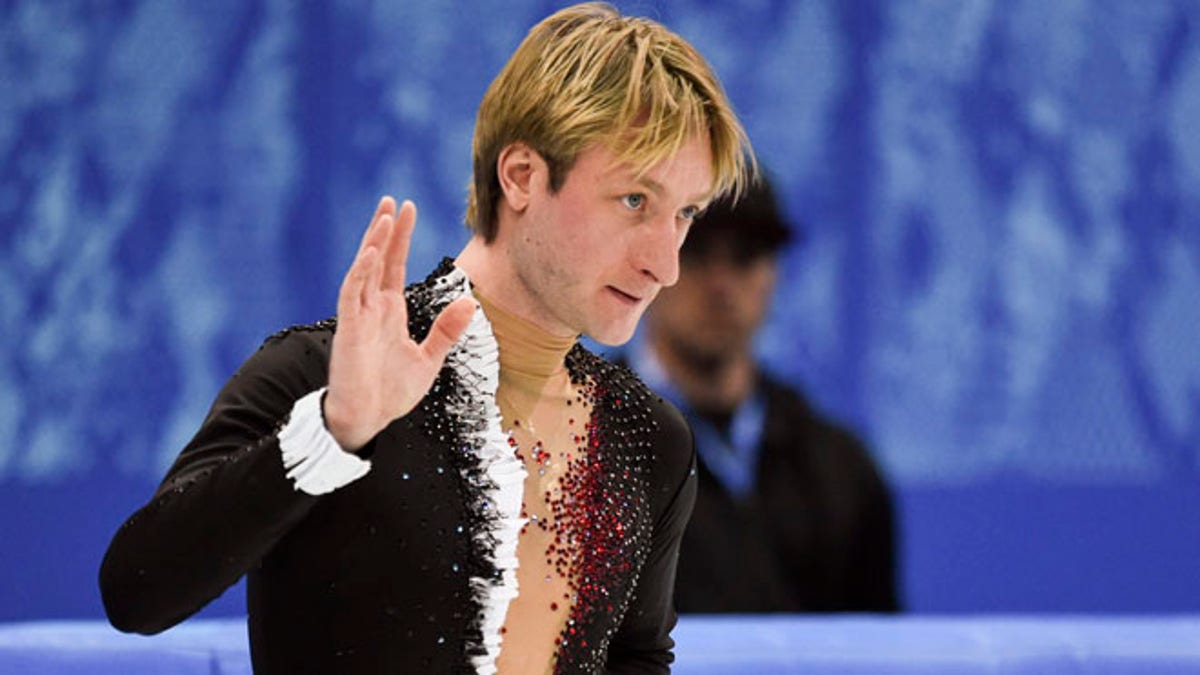
Feb. 13, 2014: Evgeni Plushenko of Russia, waves as he leaves the ice after withdrawing from the men's figure skating competition due to illness at the Iceberg Skating Palace during the 2014 Winter Olympics in Sochi, Russia. (AP/The Canadian Press)
Russians are turning on legendary figure skater Evgeni Plushenko -- their own countryman -- a day after he dropped out of the Sochi Olympics for medical reasons.
Plushenko's strong performance in the team event helped Russia earn its first gold medal at the Sochi Games, along with wide accolades for his determination to overcome a prior back injury. But on Thursday he withdrew before the men's short program, complaining of severe spinal pain during the warmup.
Plushenko received loud cheers as he took the ice in preparation for his routine, but when he limped out of the Iceberg Skating Palace, the cheering stopped, eventually turning into mild applause.
“I feel sorry for my fans, and I feel sorry for everybody. But I tried – I tried until the end…I almost cried there, because it’s hard, believe me. This is the end of my career," an emotional Plushenko said in an interview with NBC shortly after he skated off Olympic ice for the last time. "I am normal people like you. I'm not robot. I try my best and I try to go 'til the end."
But on Friday, some Russians suggested Plushenko didn't go far enough.
"I think Zhenya will understand my words," said longtime rival Alexei Yagudin, the 2002 Olympic gold medalist, using the familiar version of Plushenko's name. "We always competed through the pain."
Alexei Yagudin told the R-Sport news agency he supports "people who go to the end."
Plushenko was Russia's only men singles skater in Sochi. He won the slot in a closed exhibition skate that cut out Maxim Kovtun, who beat him in the Russian nationals.
The choice of Plushenko as the sole Russian man was debatable. Although he was the dominant skater the past 15 years, with an Olympic gold and two silvers before coming to Sochi, he is 31 years old and underwent back surgery a year ago. When he was selected, advocates argued his long international experience made him a stronger choice than the 18-year-old Kovtun.
But that came under sharp questioning Friday.
"You should go when it's time," Ruslan Nugmatullin, a former Russian national soccer goalkeeper said on Twitter. "Kovtun earned the right to participate in Sochi2014."
Alexei Urmanov, the 1994 Olympic gold-medal winner, suggested that Plushenko's hubris backfired.
"It's on the conscience of Zhenya, the team and the federation," he was quoted by R-Sport.
Plushenko's coach, Alexei Mishin, defended the skater for competing in the Sochi Games.
"At the end of the free skating [in the team event], he was feeling unsure. I have worked with him for 20 years. We have had lots of success," Mishin said, according to FoxSports.com. "This is one incident in 20 years when he was not successful. Please be positive to him and respect him."
To some politicians though, Plushenko's withdrawal was a blow to Russia's national pride.
"Perform through the pain for the honor of the country," Igor Lebedev, a parliament member from the nationalist Liberal Democrats, said on Twitter.
Elena Vaitsekhovskaya, the figure skating correspondent for Russia's Sport-Express newspaper, seemed weary not only of the intrigue behind Plushenko's selection but also of the appearances of his flamboyant wife, Yana Rudkovskaya, in the mixed zone to support him.
"All of this was reminiscent of an incompetently directed stage show," she wrote. "It became harder and harder to sympathize with the athlete."
"The one-man show in Sochi has concluded. Real sport has begun," she said in the newspaper's Friday edition.
But more complaints may still come.
"After Sochi, the federation will have to answer for its choice," nationalist lawmaker Vladimir Zhirinovsky said.
Plushenko retired from figure skating Thursday after withdrawing from the Olympics.
The Associated Press contributed to this report.
